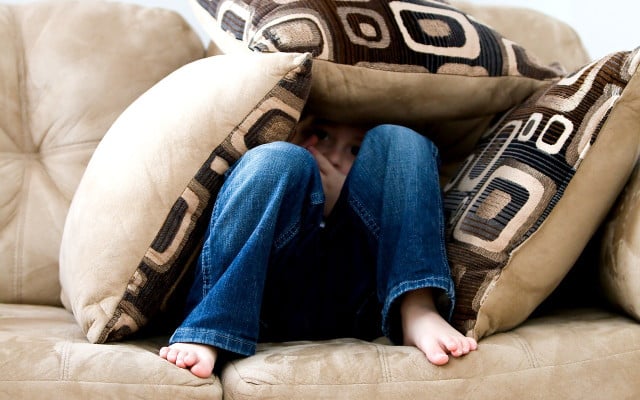
Highly sensitive people, it is said, experience the world differently than the rest. So is being highly sensitive more than a trend? Our author explains what is behind the term and reports on her own experiences.
Mindfulness, self-love, high sensitivity – you might think that concepts like these are in fashion, but you’ve been reading and hearing about them almost everywhere for some time now. That there is something to mindfulness and meditation is now quite well scientifically proven, and self-love can also be proven to help many people.
High sensitivity, on the other hand, has not had it easy with doctors, psychotherapists and in science as well as with laypeople – it is often regarded as a silly neurosis or even imagination. Yet for many highly sensitive people, coming across the concept seems like a revelation. As the phenomenon has become better known, its social perception is slowly changing.
What is high sensitivity?
High sensitivity is a psychophysiological concept to explain the intra-societal differences in the development of sensitivity to stimuli and the processing of stimuli. In short, she explains that some people are more sensitive to stimuli than others due to neurological peculiarities, without being able to control this. Affected people are often overexcited more quickly, i.e. overstimulated.
However, many allegedly or actually affected also report that their sensitivity also enables them to enjoy particularly fine pleasures. For example, highly sensitive people should be particularly empathetic and creative, be able to recognize connections faster than others, tend to search for meaning, be more emotionally involved, for example, be able to perceive music and other arts much more finely than people with average processing.

Important: High sensitivity is neither a disease nor a mental disorder, even if high sensitivity makes highly sensitive people more vulnerable. It is more of a personality trait or temperament trait.
The world of highly sensitive people
Due to their weak stimulus filters, highly sensitive people not only perceive significantly more than other people, they also process it more broadly and deeply. These stimuli can come from both the outside and the inside. If external stimuli such as light, noise, touch or heat mix with internal ones such as hunger or worry, highly sensitive people (HSPs for short) quickly feel overwhelmed, overwhelmed and washed away. Because HSPs are often unaware that they are highly sensitive, many report that they simply feel “different” or out of place.
I myself have long searched for an explanation for depressive episodes, unforeseen aggression, exhaustion and this feeling of being different. After weeks of tormenting the internet, I finally came across the English Wikipedia entry on “sensory processing sensitivity” – and felt drawn to it. The absolute relief and the first tips for dealing with myself came a few weeks later with the book “Zart besaitet” by Georg Parlow.
High sensitivity: state of research and diagnosis
Elaine N. Aron established the concept of specific stimulus processing (SPS) in the 1990s and it was not easy for her at first. The majority of doctors and therapists were of the opinion that no new explanations were needed for neuroses that were already sufficiently explained in other concepts.

However, even before Aron, researchers had dealt with stimulus perception and put forward the thesis that the stimulus threshold of the thalamus (core area of the diencephalon that processes almost all sensory impressions) is lower in HSPs than in other people.
The results of studies on the frequency of high sensitivity today range from around 3 percent to 30 percent of people, with the latter result belonging to the most recent study from 2018.
The diagnosis is difficult: High sensitivity is neither a disease nor a firmly established medical concept. Sooner or later, many HSPs end up with therapists because they break down under what feels like normal everyday demands. People who are assigned to the highly sensitive spectrum seem to be significantly more susceptible to burnout due to their weak stimulus filters. Instead of considering high sensitivity as the cause, there is often a colorful bouquet of diagnoses over the years, most of which include ADHD, anxiety disorders and depression.
A nervous system stretched to the breaking point
I have received all of these diagnoses myself, but since I have dealt with my sensitivity and learned to deal with it, I have been completely symptom-free. My symptoms were signs of a nervous system that was constantly stretched to the breaking point and a feeling of never being enough. Of course, this can lead to depression, anxiety, and hyperactivity, but these are the symptoms, not the diagnosis.

There is a simple trick to rule out ADHD: HSPs love a low-stimulus environment and “function” much better in it, while people with ADHD do not. They often even need additional stimuli in order to be able to concentrate better.
Controversial concept
The truth about high sensitivity also includes: Although there has been some research in the field over the past 30 years, the concept remains controversial among professionals. However, it is valued and taken seriously by those affected and now also by some psychotherapists. Georg Parlow made the term known to the masses. In recent years, the author and self-proclaimed high sensitivity expert has operated one of the few German websites that provided information about high sensitivity, offered a forum for those affected, and even provided a fairly extensive self-test.
Many HSPs first became aware of their otherness through this website – even if it is clearly questionable how scientifically the online self-test should be classified. Many of those affected see it as a helpful first step. In 2003 Parlow’s book “Tender Besaitet – Self-Understanding, Self-Respect and Self-Help for Highly Sensitive People” was published, which is not a scientific work, but is now considered a basic work on high sensitivity – and has probably not only shown me personally a way to protect myself and appreciate.
The everyday life of highly sensitive people – personal tips from a person affected
Since the concept of high sensitivity is scientifically controversial and there are no scientific or even medical guidelines for dealing with it, it is difficult to scientifically substantiate the following section.
My personal evidence on the subject comes from years of exchange with other affected people in forums, tips from specialized coaches, reading many highly sensitive life stories as well as specialist articles and books – and of course self-awareness.

In my experience, HSPs have just as many capacities as average processing people, only they are “emptied” more quickly by stimuli. So no matter how sensitive you are, and in what way, you should protect yourself to some extent from stimuli. My personal favorite gadgets are earplugs, which I also wear every day, blue filter glasses, which are not only useful in front of the monitor, and everything that keeps my hair out of my face, because constant touching is unbearable for me.
Using your personal resources can also be incredibly empowering. If you finally admit the high level of sensitivity, which can amount to an outing, you quickly realize that you don’t really fit into this society. Parties can quickly overwhelm you, as can loud conversations, lots of people or hustle and bustle – understandable if you assume that as an HSP you absorb many times more information than everyone else.
This can be stressful because you often have to decide between wanting to belong and wanting to feel good. It takes strength to stay at home with a book while the rest party – but it also donates some. The acceptance of one’s own sensitivity promotes the acceptance of one’s own needs and talents for many of those affected, and that can be particularly fulfilling for highly sensitive people.
The arts, introspection, mind games, philosophy, but also dealing with nature or just staying in it can enrich my personal experience to a depth that is difficult for other people to access. Self-care and self-love should be a priority at this stage, and giving yourself plenty of time and rest in the process helps. Meditation and other relaxation techniques can help to shed the “stimulus ballast” that has accumulated during the day in the evening.
Discovering your own high sensitivity, if you accept it, becomes – at least that’s how I experienced it – an inspiring journey to yourself and opens up many possibilities, but you will have to be willing to make radical decisions about your own needs.
Regardless of how widespread high sensitivity really is and how individuals deal with it: The social attention that the concept is currently experiencing could help to make people more sensitive to the different needs of others and to make them more tolerant. And that would already have gained a lot.
Read more on Techzle.com:
- These thought traps prevent you from living a sustainable life – and this is how you overcome them
- Can you plan happiness? Tips from happiness research, philosophy & Co.
- Sustainability: These training and further education opportunities exist